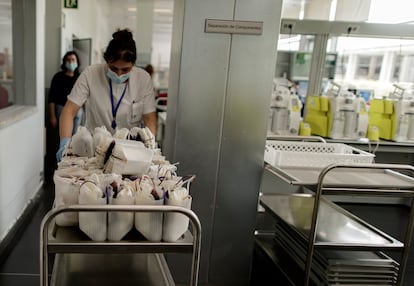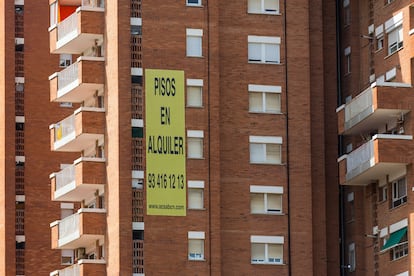Daily coronavirus deaths in Spain rise again to 229
Health authorities say a decision will be made today about which regions move to Phase 1 of the government’s deescalation plan

Official figures from the Spanish Health Ministry released on Friday showed that there were 229 coronavirus-related fatalities in the last 24 hours, a slight rise from the 213 recorded on Thursday.
Despite the rise, the figures are in “line with previous days,” said Fernando Simón, the director of the Health Ministry’s Coordination Center for Health Alerts and Emergencies, at the government’s daily news conference on Friday.
The number of daily coronavirus fatalities in Spain was 244 on Wednesday, 185 on Tuesday and 164 on Monday and Sunday. The total death toll since the beginning of the pandemic now stands at 26,299.
The latest figures showed not only a rise in daily fatalities, but also in the number of hospital and intensive care (ICU) admissions. In the past 24 hours, 85 coronavirus patients were admitted into the ICU, the highest number in nine days. Most of these admissions (58) were reported in the northeastern region of Catalonia. No other region recorded more than 10 ICU patients. With regard to hospital admissions, the number rose to 762, which is in keeping with figures reported over the last week. Since the beginning of the pandemic, 131,148 coronavirus patients have recovered from the disease and been discharged from hospital.
The spike in new cases was also significant. In the past 24 hours, there were 1,095 new coronavirus infections, as measured by the more reliable PCR testing, bringing the total to 222,857. This is a noticeable increase from previous days, when between 700 and 800 new cases were reported.
Simón indicated on Friday that most coronavirus cases were reported in two regions – Madrid and Catalonia. “The rest of the territory has a 0.38% rise in contagions, which equates to a drop of 25%,” he said.
The health official explained that the data would soon start to reflect whether the relaxation of confinement measures has impacted the curve of the coronavirus outbreak. Although it is still too soon to come to any conclusions, the figures over the next few days should reveal to what extent the deescalation plan has led to a spike in new cases.
Next phase of deescalation plan
The government will announce Friday afternoon which regions in Spain have been granted approval to move to Phase 1 of the deescalation plan to relax coronavirus confinement measures.
All regions except Catalonia and Castilla y León have requested to move to this stage, which allows social gatherings of up to 10 people and sidewalk cafes to open at 50%. These two regions have requested introducing Phase 1 in some of its territory, excluding the larger population centers.
The Madrid regional government sent its petition to move to Phase 1, despite the objections from the region’s director general of Public Health, Yolanda Fuentes, who resigned on Thursday night in protest. According to sources from the central government, Madrid is unlikely to be allowed to ease the current restrictions, given the high number of cases recorded in the region.
The request triggered political reaction on Friday. “People are shocked to see that some individuals are aiming for political gain by playing with something as serious as saving lives,” said Deputy Prime Minister Pablo Iglesias, leader of the leftist Unidas Podemos, the junior partner in a coalition led by Pedro Sánchez of the Socialist Party (PSOE).
Coronavirus crisis hits rental market in Catalonia
The rental market in Catalonia has been hit hard by the coronavirus crisis, according to figures from the Catalan regional government. These figures indicate that during the month of March – the state of alarm was declared on March 14 – rental agreements fell by 25% both in Barcelona and in the rest of Catalonia. In April, that number dropped by 75% (from 9,914 to 2,978 in the region and from 3,119 to 914 in Barcelona).

The data refers to agreements of previously settled rental contracts or contracts that are automatically renewed. The market has come to a standstill under the coronavirus lockdown, given that apartment viewings are not possible, and won’t be allowed until Phase 1 of the government’s deescalation plan. What’s more, while the state of alarm is in place, tenants are allowed to request to extend their leases. The sector has warned that rental prices are likely to fall in response to the economic fallout of the crisis, which has led to mass job losses and furloughs.
Canary Islands develops system to predict new cases
The health service in Spain’s Canary Islands has developed a system based on telephone calls to predict new coronavirus cases up to five days in advance. “We saw there was an interesting correlation between the number of calls [to the health service] and the cases we diagnosed days later, so we asked Las Palmas University to do a study to corroborate it,” said Antonio Olivera, the head of the Canary Island Health Service (SCS).

“In some ways it’s obvious, because lots of people make calls when they start to notice symptoms. But, as far as we know, no one had measured this or thought of using it as a management tool.”
Beatriz González López-Valcárcel, an economics professor and one of the government’s coronavirus experts, was the specialist who oversaw the study. She discovered that for every 100 new calls for information, “2.4 [coronavirus] diagnoses could be expected within five days.”
The study was based on Level 2 calls, where a patient, after identifying themselves and explaining their case, is transferred to a nursing professional. According to López-Valcárcel, the correlation between the number of calls to SCS and later diagnoses is “very high,” 80.1% in the island of Santa Cruz de Tenerife and 82.7% in Las Palmas.
The Spanish Health Ministry has asked the SCS for more information about the initiative.
Extension of temporary layoff plans
Spain’s Labor Ministry and social organizations reached an agreement Thursday night to extend the temporary layoff scheme, known as ERTE, and a large number of its benefits until June 30. The agreement however is not binding, and must be ratified by Spain’s UGT and CCOO unions, as well as the business associations Cepyme and CEOE. Around 3.4 million people in Spain have had their jobs temporarily or partially suspended through ERTEs.
With reporting by Clara Blanchar, Oriol Güell and Manuel V. Gómez.
English version by Melissa Kitson.
Tu suscripción se está usando en otro dispositivo
¿Quieres añadir otro usuario a tu suscripción?
Si continúas leyendo en este dispositivo, no se podrá leer en el otro.
FlechaTu suscripción se está usando en otro dispositivo y solo puedes acceder a EL PAÍS desde un dispositivo a la vez.
Si quieres compartir tu cuenta, cambia tu suscripción a la modalidad Premium, así podrás añadir otro usuario. Cada uno accederá con su propia cuenta de email, lo que os permitirá personalizar vuestra experiencia en EL PAÍS.
¿Tienes una suscripción de empresa? Accede aquí para contratar más cuentas.
En el caso de no saber quién está usando tu cuenta, te recomendamos cambiar tu contraseña aquí.
Si decides continuar compartiendo tu cuenta, este mensaje se mostrará en tu dispositivo y en el de la otra persona que está usando tu cuenta de forma indefinida, afectando a tu experiencia de lectura. Puedes consultar aquí los términos y condiciones de la suscripción digital.








































